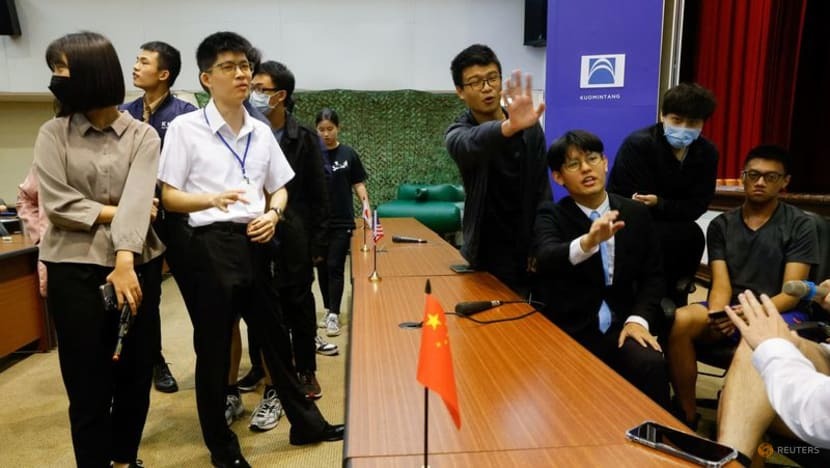Taiwan parties battle for younger voters as high-stakes elections loom
31 August, 2023

From belting out pop songs to fielding hairstyle questions on Instagram, Taiwan's presidential hopefuls are increasingly turning their attention to young voters, who are expected to play a key role in the presidential and parliamentary elections.
The outcome of the closely watched January 2024 vote will set the tone for Taipei's tumultuous relationship with Beijing, which has refused to rule out forcibly seizing the island of 23 million even as the United States has pledged to defend it.
In 2020, just after democracy protests in the Chinese-ruled city of Hong Kong, Taiwan President Tsai Ing-wen and her Democratic Progressive Party (DPP) won a landslide victory partly because of high turnout among younger voters, according to analysts and voter surveys.
The DPP is on track to retain power for a third term, with the party's candidate, Vice President William Lai, 63, leading opinion polls. Younger voters are again playing a role - but this time they are gravitating to dark horse candidate who has become the DPP's closest challenger.
Ko Wen-je, a 64-year-old former Taipei mayor, has won over many younger voters with plain talk on issues such as high housing costs rather than focusing on the China threat. Taiwanese youth "cannot find good jobs, cannot afford to buy houses, do not dare to get married and do not want to have kids," Ko told a youth forum in August. "Being innovative is Taiwan's only solution."
Known affectionately by his supporters as KP, Ko's non-traditional approach to politics - as seen in his energetic dance moves at a fundraising concert last month - has also endeared him to young voters fed up with how two parties have dominated the island's politics.
Although Ko, of the small Taiwan People's Party (TPP), lags Lai by 17 percentage points, he leads among voters younger than 40, according to a survey conducted in mid-August by the Taiwanese Public Opinion Foundation.
Lai and the DPP, which China paints as secessionist, have framed the ballot as a choice between democracy and authoritarianism. The party's traditional rivals the Kuomintang (KMT), who favour closer ties with Beijing, have cast it as a "war or peace" election.
"My responsibility is to give hope to the young people. Only when the young people have hope does our country have hope," Lai told foreign media last week, when asked why young people were drifting from the DPP.
A late bid for the presidency announced this week by Terry Guo, 72, the billionaire founder of major Apple supplier Foxconn has further energised the race to win over voters.
Some younger voters may show their hands late, so Ko's appeal to that demographic could close the gap with Lai.
"If young people who don't vote or infrequently vote at a certain moment come out to vote, they really could have a critical impact on the election," said Chen Kuang-hui, a political science professor at Taiwan's National Chung Cheng University.
At the end of 2022, about 19 million of Taiwan's 23 million people were eligible to vote, with about a third aged between 20 - the legal voting age - and 39, government data shows.
Although voting data is sparse, Chen and other political watchers pointed to a survey by Taiwan's Central Election Commission showing that turnout of those 30 or younger rose by 15 per cent to 20 per cent in 2020 compared with the previous two elections. The turnout for people aged 31 to 40 increased 10 per cent to 15 per cent, the survey said.
LECTURES AND INSTAGRAM
At third place in the polls, and trailing both Ko and Lai in the under-40 cohort, is Hou Yu-ih, 66, the candidate for the KMT, which once ruled all of China before losing a civil war to Mao Zedong's Communists and fleeing to Taiwan.
Capturing the youth vote is a perennial challenge for Taiwan's former governing party, with only about 3 per cent of its 300,000 members younger than 40, KMT official Ho Chih-yung told Reuters.
In recent months the party has held youth programmes, including a model parliament and seminars on possible conflicts with China.
"Every four years, there are first-time voters coming out that could be the margin between victory and defeat," said Ho, who helped organise the events. "Every party is trying to get their support."
Focusing on such issues may struggle to win over would-be voters such as Zheng De-wei, 25, a graduate student who said his friends are more concerned about getting by in an economy set to grow at its slowest pace in eight years.
"The priority is to be able to make a living," said Zheng, who described himself as "politically neutral".
Although it may have a healthy lead in opinion polls, the DPP is acutely aware of the dangers of losing younger voters.
In an official review of its defeat in November's local elections, where its China-focused campaign failed to mobilise voters more concerned with issues such as crime and pollution, the DPP said it must "deeply reflect" on why it had "lost the support of young people".
In a bid to win them back, Lai has ramped up social media campaigns, recently hosting an "ask me anything" session on Meta Platforms' Instagram, where he was asked several questions on his middle-parting hairstyle.
"It's more important to update what is under one's hair than to update one's hairstyle," Lai quipped.
Source: www.channelnewsasia.com
